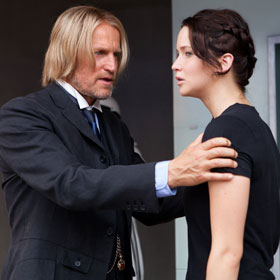The Hunger Games

4/5
You have to admit it. As far as Young Adult (YA) trends go, dystopian, blood-drenched, televised death matches are way cooler than lovesick vampires. Even if it is a re-hashed idea, The Hunger Games is a scenario that appears again and again throughout the history of civilization. Roman gladiatorial battles are the first to come to mind — also, more specifically, Running Man and Games predecessor Battle Royale. Not only does The Hunger Games’ story provide a wider scope than most traditional YA franchises — literally depicting teenage love as a feint, as a tool for survival rather than swooning emotion — it allows room for social, moral and cultural commentary, making the book series, as well as the movie, one of the smartest in its genre.
Based on Suzanne Collins’ best selling trilogy (as if you didn’t already know), The Hunger Games takes place in an unspecified future where the former United States, now known as Panem, is divided in twelve “districts.” Each year, under orders from the omniscient and decadent Capitol, the districts must proffer one boy and one girl, each between the ages of 12 and 18, as penance for past rebellions. In an event masquerading as celebration, these “tributes” are then unwillingly pitted against each other in a battle to the death, which is broadcast, apropos, in reality television style.
Given the success of the books, the movie has a noteworthy cast to back up the hype. Jennifer Lawrence (Winter’s Bone) plays Katniss Everdeen with salt-of-the-earth authenticity. Lawrence shows a graceful range of emotion, moving believably from grief to stoicism. She provides a dynamic performance, one that could have easily become stock heroine. Lawrence’s Katniss isn’t beyond reproach, but she has a cool, impermeable swagger that lacks any righteous indifference. Katniss is a strong and independent character whose convictions, in Lawrence’s hands, become relatable without being overbearing.
Josh Hutcherson does a good job of breaking out of the family-safe roles we’ve come to recognize him for, but he’s far from alienating his tween-to-teen audience. As Peeta, Katniss’ fellow District 12 tribute, Hutcherson is brooding, unsure, and quick to impress. He plays the role with the downcast eyes of a beaten dog with a treacherous streak and does a decently nuanced job.
Rounding out the supporting cast of adults are Elizabeth Banks, Stanley Tucci, Lenny Kravitz, Woody Harrelson and Donald Sutherland. All are elaborately dressed in bright colors, fancy dos and outrageous make-up, but it’s really Harrelson as the former Hunger Games victor turned drunkard, Haymitch Abernathy, who stands out above the camp. Then again, Harrelson is just doing what he does best, playing larger-than-life characters with clear flaws, but nobody can deny the entertainment value there.
What really hamstrings The Hunger Games is director Gary Ross’ shaky hand and a slightly antiquated vision of the future. While it’s understandable that some amount of frantic camera work is needed to depict violence in such a way as to keep the marketable PG-13 rating, there are some scenes where fidgety editing and handheld-esque angles are not only unnecessary but harmful as well. The costumes, garish and intricate, at times come off as absurd, bordering on parody, and the set designs, especially the Capitol seen from long shots, look like the future according to the mid-'90s. That being said, there are times when the look and feel of the movie is refreshing and surprising. Katniss’ hometown, with its washed out blues and grays, is a good example of an original take on post-apocalyptic society. In comparison, though, the opulence of the Capitol seems expected and unimaginative.
What makes The Hunger Games an attractive movie for both YA audiences and the older set of moviegoers (and readers) is easy to see. There’s action and violence, yes, but it’s the themes in The Hunger Games that are so lasting and accessible — the existential struggle to survive, physically and spiritually. Before they go into battle, Peeta tells Katniss he won’t let “them” change who he is, even if it means he has to die. That type of message alone is a helluva lot more useful than some silly, unrequited vampire love.
RELATED ARTICLES
Get the most-revealing celebrity conversations with the uInterview podcast!







Leave a comment